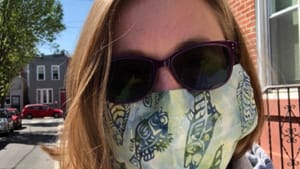Stay in the Loop
BSR publishes on a weekly schedule, with an email newsletter every Wednesday and Thursday morning. There’s no paywall, and subscribing is always free.
Lifting quarantine taboos
Four things we should be allowed to say about life in COVID-19 lockdown

There’s a game going around social media where cabin-fevered folks divulge unpopular opinions. Revelations include distaste for Bob Dylan, vilification of voice-activated devices, and abhorrence for butter. I shared my own (Shar-Pei dogs; lakes; food trucks…), but something’s still missing. Stuck at home in the COVID-19 pandemic for close to a month now, I feel like there are some things I'm not supposed to say.
All things considered, life is cozy at my house. I even had advice for you about working from home. And I know I’m supposed to be finding silver linings: the break from the world; the inspirations and optimism; the magic of connecting digitally in solitude; crusty homemade bread with yeast we farmed ourselves and all that shit. “The trick, as the great religions teach us, is counterintuitive,” Andrew Sullivan waxes lyrical in the March 30 issue of New York magazine. You must "gain some balance and even serenity in absorbing what you can't."
We all know the world is terrible right now (and way more terrible for some than others, as usual), but I feel as if we can’t really talk about it, for fear of upsetting acceptable social narratives about the pandemic or provoking a hail of self-righteous criticism from people who have the privilege of doing everything right.
I’m cooking. I’m working from home. I’m reading. I’m learning a new language. I'm wearing a mask when I walk the dog. And I'd like to break four coronavirus lockdown taboos.
Live-streamed arts events aren’t making isolation easier for me. I wish I could say that my forays into digital-access arts have been wholly comforting and satisfying. So far, I’ve tuned in online for storytelling, music, theatrical performances, improv, and stand-up, including some I’ve bought tickets for. I am pleased this stuff is happening and glad to support the work with my slimming bank account (the pandemic has slowed my paychecks). I will continue to support it and tune in. I’m also aching for the time when we, audiences and journalists and artists, were in the room together. When I first read Alix Rosenfeld’s piece about where to find theater artists in the COVID-19 shutdown, I had a sudden storm of tears because I didn't know when I will walk into a theater again. We still don’t know. It feels like a break-up. It feels like grief.
Seeing physically distanced neighbors doing what they can to connect doesn’t feel uplifting to me. It makes me want to weep. Last week, I was walking my dog down a small street in my neighborhood when I noticed the residents assembling on their stoops. They all began to sing “Happy Birthday” to someone who was celebrating in quarantine. I want to focus on the sweetness of moments like that. The promise that physical distance and weeks indoors aren’t ruining our urge to mark special moments together. But while my neighbors were singing, I also despaired at how much each front stoop seemed like a little concrete island. How nobody would be giving hugs or eating cake together.
Video-conferencing does not make me feel more connected. I know, I know: through the miracle of the internet, we don’t have to miss a thing. And I’ve tried. I’ve tried a happy hour, a date, family visits, an industry meeting, karaoke, and a bridal shower. And when the faces on the screen disappear and I’m still at my desk, just like I was before the call started, I feel a thud of loneliness that seems all the worse for the temporary sight and sound of loved ones, friends, and colleagues, appearing and disappearing as easily as the movies I stream.
A pandemic doesn’t erase mental-health emergencies. Look on your social-media feed and you’ll see somebody excoriating folks who claim that they broke physical-distancing recommendations for the sake of someone’s mental health. Are there cases of medically unsanctioned rendez-vous—a friend, a lover—that were irresponsible and unnecessary? Sure. (I hear some jerks are still going on Tinder dates.)
But a little over a week into my own isolation, I got a phone call from someone I care about who was inches from a serious suicide attempt. He was uninjured and posed no risk to others, but he was in peril as long as he was alone. Since all the medical advice I’ve seen for the past two months urges us not to sit in an ER or hospital if we don’t absolutely have to, I immediately welcomed him to my house, with practical precautions, and made sure he was safe while he alerted his professional care team.
If my neighbor was having a heart attack, I wouldn’t watch her fall and say, “Sorry, I’m physically distancing.” Mental health crises can be just as dangerous, so let’s not pretend that shouting “stay at home!” erases that fact. There will be moments when we have to make our own decisions about how we help others in crisis, and even in a pandemic, there is no one-size-fits-all rule for those moments.
Why say it?
What good does highlighting the negative do? I don’t know for sure. But I do know that an avalanche of writing prompts and art projects and productivity tips and Instagram bread-baking brags and Zoom meetings aren’t easing the ache of not being able to embrace my friends. Maybe before we can talk ourselves into some real coping strategies for this crisis, we have to be honest about what's really happening to our lives and how we feel about it.
Sign up for our newsletter
All of the week's new articles, all in one place. Sign up for the free weekly BSR newsletters, and don't miss a conversation.

 Alaina Johns
Alaina Johns